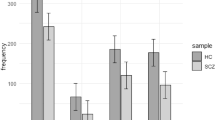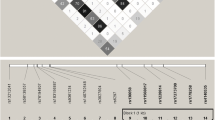Abstract
Objective
Schizophrenia is an acute mental disorder with an undefined etiology. Its high heritability suggests that several genetic variants and polymorphisms may contribute to the severity and emergence of its symptoms. Former molecular evidence has shed some light on the association of serotonergic pathway genetic polymorphisms with schizophrenia. This study aimed to investigate the association between schizophrenia and two SNPs from one haplotype block, which lies in the 5-hydroxytryptamine receptor 2 A (5-HTR2A) gene in the Iranian population.
Material and methods
Blood samples were collected from one-hundred and fifty-two patients diagnosed with schizophrenia and one-hundred and fifty-eight cases of the healthy control, who were matched in terms of age and gender. The participants were genotyped for rs6311 and rs6313 using PCR-RFLP. R programming language and Haploview software were respectively leveraged for statistical and haplotype inferencing.
Results
The results showed that there was no significant association between rs6313 and schizophrenia. However, the rs6311 T allele was independently associated with schizophrenia, and it was significantly associated with SCZ in an rs6311-rs6313 haplotype. Moreover, the general linear model confirmed the potential predictor role of rs6311 for schizophrenia and the C allele of rs6313 demonstrated a higher frequency among females compared to males.
Conclusion
The findings of this study indicated the association of rs6311 and rs6311-rs6313 haplotype with schizophrenia in the Iranian population and also suggested a potential schizophrenia risk predictor role for rs6311.
Similar content being viewed by others
References
Kahn RS, Sommer IE, Murray RM, Meyer-Lindenberg A, Weinberger DR, Cannon TD et al (2015) Schizophrenia Nat Reviews Disease Primers 1(1):15067
Lichtenstein P, Yip BH, Björk C, Pawitan Y, Cannon TD, Sullivan PF et al (2009) Common genetic determinants of schizophrenia and bipolar disorder in swedish families: a population-based study. Lancet 373(9659):234–239
Marsden CA (2006) Dopamine: the rewarding years. Br J Pharmacol 147(Suppl 1):S136–S144
Hamon M, Lanfumey L, el Mestikawy S, Boni C, Miquel MC, Bolaños F et al (1990) The main features of central 5-HT1 receptors. Neuropsychopharmacology 3(5–6):349–360
McLaughlin DP, Little KY, López JF, Watson SJ (1996) Expression of Serotonin Transporter mRNA in human brainstem raphe nuclei. Neuropsychopharmacology 15(5):523–529
Haddley K, Vasiliou AS, Ali FR, Paredes UM, Bubb VJ, Quinn JP (2008) Molecular genetics of monoamine transporters: relevance to brain disorders. Neurochem Res 33(4):652–667
Sinopoli VM, Burton CL, Kronenberg S, Arnold PD (2017) A review of the role of serotonin system genes in obsessive-compulsive disorder. Neurosci Biobehav Rev 80:372–381
Blier P, El Mansari M (2013) Serotonin and beyond: therapeutics for major depression. Philosophical Trans Royal Soc Lond Ser B Biol Sci 368(1615):20120536
Mann JJ, Arango V, Underwood MD (1990) Serotonin and suicidal behavior.Annals of the New York Academy of Sciences. ; 600:476 – 84; discussion 84 – 5.
Bleich A, Brown SL, Kahn R, van Praag HM (1988) The role of serotonin in schizophrenia. Schizophr Bull 14(2):297–315
Dickel DE, Veenstra-VanderWeele J, Bivens NC, Wu X, Fischer DJ, Van Etten-Lee M et al (2007) Association Studies of Serotonin System candidate genes in early-onset obsessive-compulsive disorder. Biol Psychiatry 61(3):322–329
Klengel T, Binder EB (2013) Gene × environment interactions in the prediction of response to antidepressant treatment. Int J Neuropsychopharmacol 16(3):701–711
Burnet PW, Eastwood SL, Harrison PJ (1996) 5-HT1A and 5-HT2A receptor mRNAs and binding site densities are differentially altered in schizophrenia. Neuropsychopharmacology 15(5):442–455
Ruble CL, Smith RM, Calley J, Munsie L, Airey DC, Gao Y et al (2016) Genomic structure and expression of the human serotonin 2A receptor gene (HTR2A) locus: identification of novel HTR2A and antisense (HTR2A-AS1) exons. BMC Genet 17:16
Lin JY, Jiang MY, Kan ZM, Chu Y (2014) Influence of 5-HTR2A genetic polymorphisms on the efficacy of antidepressants in the treatment of major depressive disorder: a meta-analysis. J Affect Disord 168:430–438
Genis-Mendoza AD, Ruiz-Ramos D, López-Narvaez ML, Tovilla-Zárate CA, Rosa García A, Cortes Meda G et al (2019) Genetic association analysis of 5-HTR2A gene variants in eating disorders in a mexican population. Brain Behav 9(7):e01286–e
Cao J, Liu X, Han S, Zhang CK, Liu Z, Li D (2014) Association of the HTR2A gene with alcohol and heroin abuse. Hum Genet 133(3):357–365
González-Castro TB, Tovilla-Zárate C, Juárez-Rojop I, Pool García S, Velázquez-Sánchez MP, Genis A et al (2013) Association of the 5HTR2A gene with suicidal behavior: case-control study and updated meta-analysis. BMC Psychiatry 13:25
Liu J, Fu H, Kong J, Yu H, Zhang Z (2021) Association between autism spectrum disorder and polymorphisms in genes encoding serotine and dopamine receptors. Metab Brain Dis 36(5):865–870
Sun L, Xu P, Zhou YG, Zuo SR, Liu YP (2017) Meta-analysis of polymorphism rs6311 and rs6313 in the 5-HT(2A)R gene and schizophrenia. Nord J Psychiatry 71(1):1–11
Sujitha SP, Nair A, Banerjee M, Lakshmanan S, Harshavaradhan S, Gunasekaran S et al (2014) 5-Hydroxytryptamine (serotonin) 2A receptor gene polymorphism is associated with schizophrenia. Indian J Med Res 140(6):736–743
Sáiz PA, García-Portilla MP, Arango C, Morales B, Alvarez V, Coto E et al (2007) Association study of serotonin 2A receptor (5-HT2A) and serotonin transporter (5-HTT) gene polymorphisms with schizophrenia. Prog Neuro-psychopharmacol Biol Psychiatry 31(3):741–745
Yeom JW, Jeong S, Seo JY, Jeon S, Lee HJ (2020) Association of the serotonin 2A receptor rs6311 polymorphism with diurnal preference in Koreans. Psychiatry Invest 17(11):1137–1142
Zhang R, Bi Y, Niu W, Huang X, Chen S, Li X et al (2016) Association study of 5-HT1A, 5-HT2A polymorphisms with schizophrenia and major depressive disorder in the Han Chinese population. Neurosci Lett 635:39–43
Vaquero Lorenzo C, Baca-Garcia E, Diaz-Hernandez M, Botillo-Martin C, Perez-Rodriguez MM, Fernandez-Ramos C et al (2006) Association between the T102C polymorphism of the serotonin-2A receptor gene and schizophrenia. Prog Neuro-psychopharmacol Biol Psychiatry 30(6):1136–1138
Özçetin A, Poyraz B, Poyraz CA, Bozhüyük E, Bolat N, Balcioğlu İ et al (2014) T102C polymorphism of serotonin-2A receptor gene in turkish schizophrenia patients: Association with cognitive impairment and soft neurological signs. Indian J psychiatry 56(4):359–364
Søeby K, Larsen SA, Olsen L, Rasmussen HB, Werge T (2005) Serotonin transporter: evolution and impact of polymorphic transcriptional regulation. Am J Med Genet Part B: Neuropsychiatric Genet 136(1):53–57
Arnold PD, Zai G, Richter MA (2004) Genetics of anxiety disorders. Curr Psychiatry Rep 6(4):243–254
Sujitha SP, Nair A, Banerjee M, Lakshmanan S, Harshavaradhan S, Gunasekaran S et al (2014) 5-Hydroxytryptamine (serotonin) 2A receptor gene polymorphism is associated with schizophrenia. Indian J Med Res 140(6):736
Chen S-F, Shen Y-C, Chen C-H (2009) HTR2A A-1438G/T102C polymorphisms predict negative symptoms performance upon aripiprazole treatment in schizophrenic patients. Psychopharmacology 205(2):285–292
Maffioletti E, Valsecchi P, Minelli A, Magri C, Bonvicini C, Barlati S et al (2020) Association study between HTR2A rs6313 polymorphism and early response to risperidone and olanzapine in schizophrenia patients. Drug Dev Res 81(6):754–761
Smith RM, Papp AC, Webb A, Ruble CL, Munsie LM, Nisenbaum LK et al (2013) Multiple regulatory variants modulate expression of 5-hydroxytryptamine 2A receptors in human cortex. Biol Psychiatry 73(6):546–554
Ruble CL, Smith RM, Calley J, Munsie L, Airey DC, Gao Y et al (2016) Genomic structure and expression of the humanserotonin 2A receptor gene (HTR2A) locus:identification of novel HTR2A and antisense(HTR2A-AS1) exons. BMC Genet 17(1):16
Hranilovic D, Blazevic S, Stefulj J, Zill P (2016) DNA methylation analysis of HTR2A Regulatory Region in Leukocytes of autistic subjects. Autism research: official journal of the International Society for Autism Research 9(2):204–209
Kaur G, Singh Chavan B, Gupta D, Sinhmar V, Prasad R, Tripathi A et al (2019) An association study of dopaminergic (DRD2) and serotoninergic (5-HT2) gene polymorphism and schizophrenia in a north indian population. Asian J psychiatry 39:178–184
Li Z, He Y, Han H, Zhou Y, Ma X, Wang D et al (2018) COMT, 5-HTR2A, and SLC6A4 mRNA expressions in first-episode antipsychotic-naive schizophrenia and association with treatment outcomes. Frontiers in Psychiatry. :577
Gray JC, MacKillop J, Weafer J, Hernandez KM, Gao J, Palmer AA et al (2018) Genetic analysis of impulsive personality traits: examination of a priori candidates and genome-wide variation. Psychiatry Res 259:398–404
Yan-jie -Y Yue-xi-L, Lin -W et al - Associations of 5-HTR2A rs6313 gene polymorphism with depression and suicide behavior among adult females.- Chinese Journal of Public Health. 2015;- 31(– 6):- 727.
Nishizawa S, Benkelfat C, Young SN, Leyton M, Mzengeza S, de Montigny C et al (1997) Differences between males and females in rates of serotonin synthesis in human brain. Proc Natl Acad Sci USA 94(10):5308–5313
Stoltenberg SF, Christ CC, Highland KB (2012) Serotonin system gene polymorphisms are associated with impulsivity in a context dependent manner. Prog Neuro-psychopharmacol Biol Psychiatry 39(1):182–191
Polesskaya OO, Sokolov BP (2002) Differential expression of the “C” and “T” alleles of the 5-HT2A receptor gene in the temporal cortex of normal individuals and schizophrenics. J Neurosci Res 67(6):812–822
Acknowledgements
This research was supported by Tehran University of Medical Sciences under registered Grant 26440.
Author information
Authors and Affiliations
Contributions
Sareh Massoud, Maryam Salmanian, Mobina Tabibian, Toktam-Sadat Tavabe-Ghavami: data collecting and laboratory procedure, Rana Ghamari: data analysis and interpretation and writing the draft, Fatemeh Alizadeh: design, conceptualization of the experiment, and revision of the draft.
Corresponding author
Ethics declarations
Conflict of interest
All the authors declare no conflict of interest for the current study.
Additional information
Publisher’s Note
Springer Nature remains neutral with regard to jurisdictional claims in published maps and institutional affiliations.
Electronic supplementary material
Below is the link to the electronic supplementary material.
Rights and permissions
Springer Nature or its licensor (e.g. a society or other partner) holds exclusive rights to this article under a publishing agreement with the author(s) or other rightsholder(s); author self-archiving of the accepted manuscript version of this article is solely governed by the terms of such publishing agreement and applicable law.
About this article
Cite this article
Massoud, S., Salmanian, M., Tabibian, M. et al. The contribution of the 5-hydroxytryptamine receptor 2 A gene polymorphisms rs6311 and rs6313 to Schizophrenia in Iran. Mol Biol Rep 50, 2633–2639 (2023). https://doi.org/10.1007/s11033-022-08222-2
Received:
Accepted:
Published:
Issue Date:
DOI: https://doi.org/10.1007/s11033-022-08222-2




